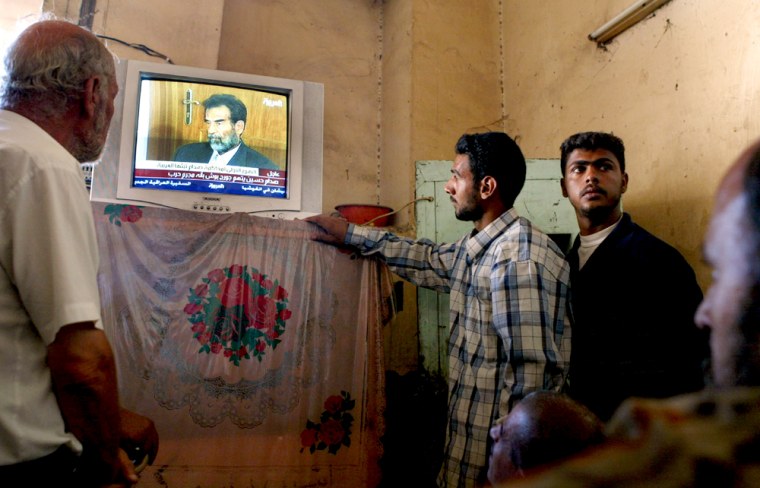Clustering around small TV sets in cafes, hotel lobbies and shops, Iraqis watched raptly as Saddam Hussein appeared in court Thursday, some seething with anger, others in unease.
Many people called for his execution, and some said he doesn’t deserve a trial. Others felt the time isn’t right to seek justice. A few defended the former dictator.
“I just hope they will try him by his own law. He knew nothing but executing people for even minor or imaginary offenses,” Khaled Mohammed, 28, said as he watched with two friends at a cafe on Baghdad’s Saadoun Street.
“Saddam should be put in an iron cage at the zoo, so all the Iraqis could come to see him,” Mohammed added, his eyes fixed on the picture broadcast by the U.S.-funded TV Iraqiya.
When Saddam appeared, the cafe fell silent.
A thirst for vengeance
“Such a person shouldn’t be tried. Standing a trial is an honor he doesn’t deserve,” said Rahman Aziz, 27, owner of a CD and cassette shop. “He should be sent directly to the gallows.”
Aziz said he was tortured in one of Saddam’s prisons for seven months, after the secret police found CDs of Shiite Muslim literature in his shop.
“Watching him today is more saddening than joyful, because this coward maniac is the one who humiliated us and made our lives hell for 35 years,” he said.
Not everyone was happy about the judicial proceedings against Saddam.
“This is not the time,” said Mohammed Mahdi, watching with several co-workers at a hotel. “Yes, he needs to be brought to justice. But the country has too many other problems now that should be fixed first.”
Mohammed Kazem, a 32-year-old laborer, disputed the need for any trial. “Saddam only hurt those who tried to harm Iraq — the traitors — not the Iraqi people,” he said.
For some, it was a day they long waited for, but didn’t expect to come.
‘I'm so glad to see him humiliated’
“Saddam Hussein is the enemy of God, humanity, children and mothers of Iraq. I’m so glad to see him humiliated like this in front of the whole world,” said Hamid al-Yasseri.
He said he had prayed God would rid Iraq of Saddam, but never imagined he would see the dictator toppled, let alone stand trial. “Execution is not enough punishment for him,” al-Yasseri said.
Qassem Jaber, a businessman, said the law in Iraq is that he who kills one person, should be killed. “But Saddam killed more than 1 million, so he should be executed, without trial, in a public square.”
Some people refused to comment, apparently fearful even now of making statements about the former regime.
“We won’t say anything,” said a woman who runs a handicrafts shop. “Even if the pictures were of him being executed, we wouldn’t talk.” An elderly man standing beside her nodded in agreement.
As Saddam appeared in court, some of the 25 million people who spent the better part of their lives under his authority voiced mixed emotions — sympathy or disgust — depending largely on where they lived.
For a Kurd, proceedings are poetic justice
For Najib Khaled, a Kurd from the northern city of Kirkuk, the images were poetic justice — Saddam in the dock before a young judge.
“I felt as if Baghdad had fallen again and that the regime was once again toppled,” said Khaled, 40, who lives in a region where the deposed leader reportedly authorized the killing of thousands. “In his day, Saddam killed thousands of Iraqi youths. Today, I am happy because I saw the day when Saddam was being judged by a young judge.”
In the central city of Ramadi, a Sunni Muslim area where support for Saddam has been strong, Odai Faleh voiced doubts that the former president was guilty of much beyond punishing those who deserved it.
“At least Saddam provided us with security. We have seen nothing good from the Americans,” he said.
Under Saddam, security was one element virtually guaranteed — if only out of fear of the regime’s security apparatus.
“He knew how to rule Iraq,” said Khaled Moufak, 21, a former soldier living in Baghdad. “He robbed us from our rights, but we and our women were able to be safe at the streets. He was executing those who are now sabotaging our country with the help of CIA.”
For some, Saddam and his era are over. “All I can say is that Saddam is already in the garbage of history,” said Khalil Jumaa, a worker at a Baghdad hotel.
